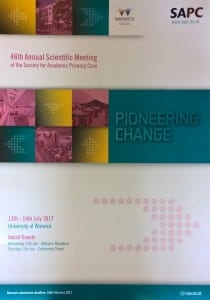 Several members of the Community and Health Research Unit have been selected for oral and elevator presentations at the forthcoming Society for Academic Primary Care Annual Scientific Meeting (SAPC ASM). This year’s conference will take place at the University of Warwick. The SAPC annual conference is the main international conference for primary care in the UK.
Several members of the Community and Health Research Unit have been selected for oral and elevator presentations at the forthcoming Society for Academic Primary Care Annual Scientific Meeting (SAPC ASM). This year’s conference will take place at the University of Warwick. The SAPC annual conference is the main international conference for primary care in the UK.
Dr Julie Pattinson will speak on her study, ‘Understanding reasons for variation by ethnicity in performance of general practice specialty trainees in the Membership of the Royal College of General Practitioners’ Applied Knowledge Test: cognitive interview study’.
Dr Zahid Asghar will also give an oral presentation on, ‘Performance of candidates with dyslexia in the Applied Knowledge Test for Membership of the Royal College of General Practitioners.’
An oral presentation will be given by Dr Murray Smith on the ‘Effect on hypnotic prescribing of a quality improvement collaborative for primary care of insomnia: a segmented regression analysis’.
 Dr Steph Armstrong will also speak at an elevator session on, ‘Ethical considerations in prehospital ambulance based research: an interview study of expert informants’, a study funded by the Wellcome Trust as part of the Network for exploring Ethics in Ambulance Trials (NEAT) project.
Dr Steph Armstrong will also speak at an elevator session on, ‘Ethical considerations in prehospital ambulance based research: an interview study of expert informants’, a study funded by the Wellcome Trust as part of the Network for exploring Ethics in Ambulance Trials (NEAT) project.
Michael Toze, will give an elevator pitch on his doctoral study, ‘Coming out in General Practice: the experience of older LGBT patients – his place ta the confernece was funded through the Best Oral Presentation Prize at the recent Trent Regional SAPC Conference hosted by CaHRU and the University of Lincoln.
Finally, the abstract submitted by Joseph Akanuwe, research assistant and doctoral student at CaHRU, ‘Exploring Service User and practitioner perspectives of QCancer use in primary care consultations’ was among the top 10 highest scoring abstracts and will be eligible to be considered for the SAPC/North American Primary Care Research Group travel prize.
The whole team have done particularly well this year to be awarded oral and elevator pitches for all abstracts presented, but our doctoral students in particular have excelled.
By Niro Siriwardena




